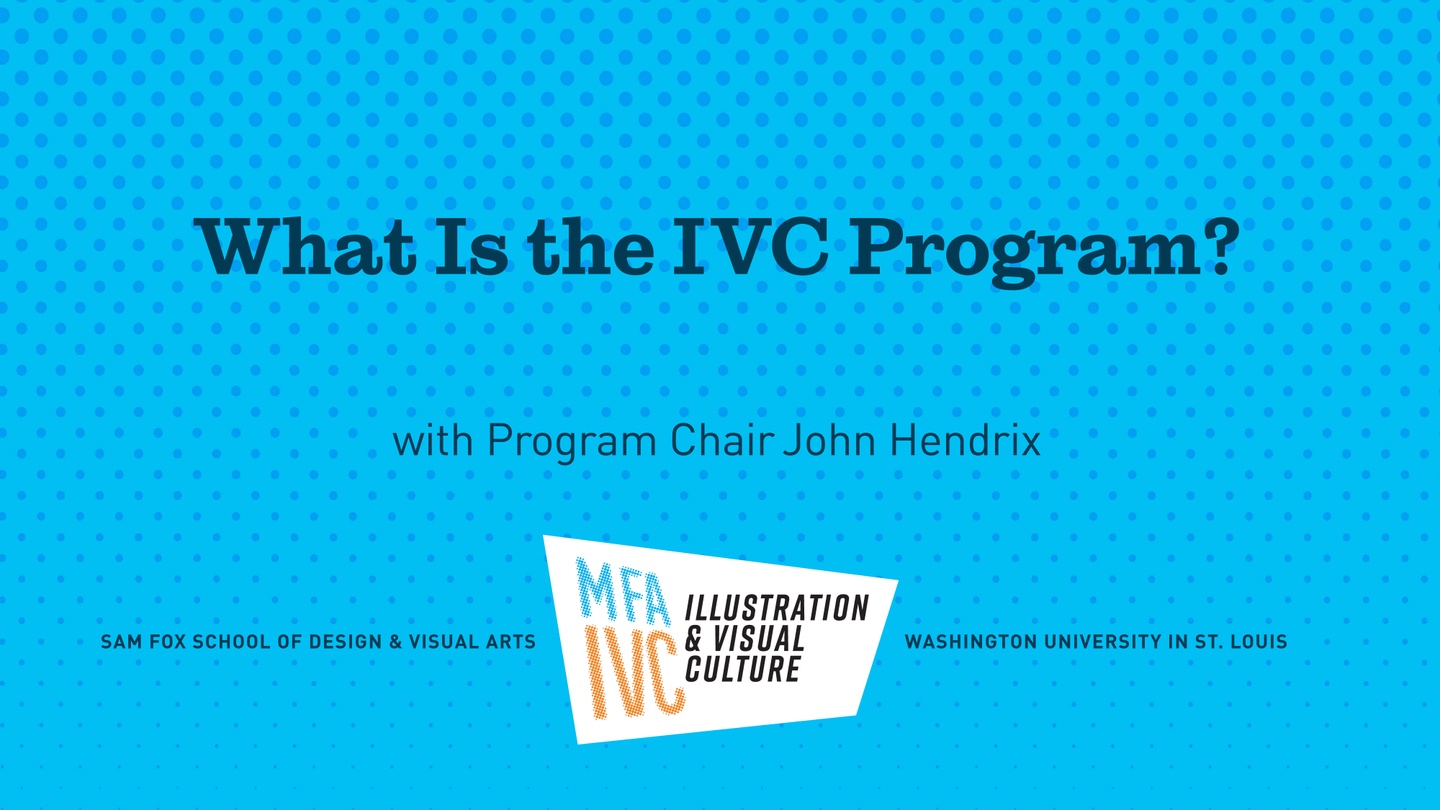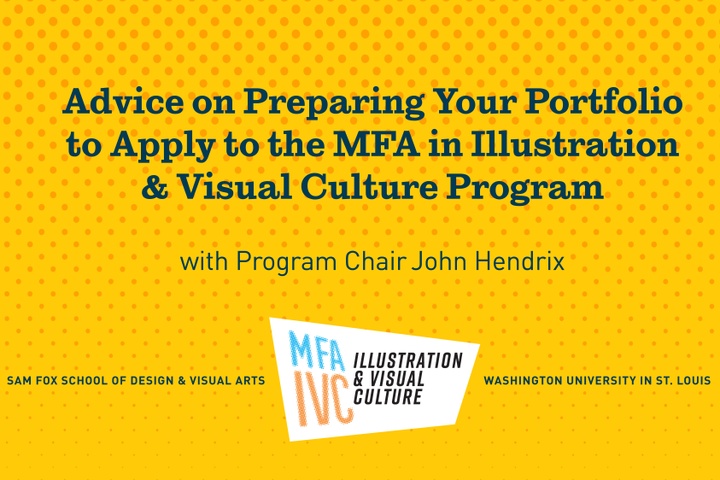Apply to the MFA in Illustration & Visual Culture Program

Thank you for your interest in the Sam Fox School’s MFA in Illustration & Visual Culture (MFA-IVC) program at Washington University in St. Louis!
Criteria for Eligibility
- Applicants should have completed a BFA or equivalent academic preparation with a minimum GPA of 3.0.
- Applicants are NOT required to submit GRE scores.
Upcoming Recruitment Events
Mar 4, 11am – 12pm • Virtual
Admitted Graduate Student Info Session: Illustration & Visual Culture Program Overview
Mar 4, 1 – 2pm • Virtual
Admitted Graduate Student Info Session: MDes for HCI and Emerging Technology Program Overview
Mar 6, 12pm – 1am • Virtual
Application Materials
The MFA-IVC program is accredited by the National Association of Schools of Art and Design (NASAD). Admissions decisions are based on the applicant’s portfolio, academic records, writing sample, statement of objectives, and references. Both writing and visual portfolio samples are required, but we do not expect applicants to be equally proficient in both areas.
Application materials may be submitted over time. However, all materials, with the exception of the letters of recommendation, must be received by the application deadline. No applicant will be offered admission into the program until all required materials have been received.
You will need:
PDF copies of your unofficial transcript(s)
Concise statement (between 300-600 words) that gives a sense of you, your creative work, and your objectives for graduate study. See details below.
A sample of expository writing. See details below.
12-20 samples of your best, strongest work. See details below.
Names, titles, and email addresses for three (3) professors, instructors, or professionals with whom you have recently worked or studied. Obtain their consent to provide a letter of recommendation for you. They will receive a request from the school once you have applied.
Applicants whose native language is not English must provide English language proficiency test scores from TOEFL IBT, IELTS, DUOLINGO English Test, or GATEWAY English Test from English3. See details under “International Applicants” below.
Non-refundable $40 application fee, paid online by credit card.
Note: there is no application fee for students who complete their application before December 15.
Your statement is a concise written statement of objectives for graduate study (300-600 words, PDF or text) that pertains to your work and educational experience. The statement should include a modest personal history and focus on your interests and connections to illustration and/or visual culture. The statement should also identify any additional disciplinary-specific interests and/or any historical and contemporary influences you have. Please make sure your name is at the top of this document.
Expository writing is intended to describe, explain, or analyze a given subject in textual form. There is no requirement for length, but it should be enough to demonstrate your ability to express your ideas clearly. Content is more important than extensive word count. Examples of writing samples could include: an undergraduate paper in art history, a critical literary analysis, a personal essay in material culture study (film, comics, illustration, objects), an article or published review, or any other piece of writing that demonstrates your ability to construct and defend an argument, position, or idea.
Program chair John Hendrix offers more advice in this handy video: What Are We Looking for in Your Writing Sample?
You will be prompted to upload a portfolio in Slideroom. Submit 12-20 images or samples of your work, including illustrations, prints, artist’s books, collage images, drawings, sketchbook pages, comics, GIFs, videos, and/or samples of time-based media that best represent your work and visual voice. Variety is encouraged; a single mode or style of work is not necessarily preferred or required. The work presented should be current and should also showcase your future potential as an image maker.
Specifications:
- Images: JPG format, 5MB maximum file size, 1,200 px on the longest side at 72dpi
- PDFs: 10MB maximum file size
- Video: MPEG or MOV format, 250MB maximum file size, no longer than 5 minutes in duration
- Audio: MP3 format, 30MB maximum file size, no longer than 5 minutes in duration
Do not use presentation programs such as PowerPoint.
All digital files submitted should follow a naming convention that includes your last name and the first initial of your first name, such as: DoeJ_GhostSeries_Image1.jpg.
Please enter details about each piece you submit, including title, date, size, and medium. Do not use this space to discuss the work.
Program chair John Hendrix offers more advice in this handy video: Advice on Preparing Your Portfolio
As part of the application review, we are required to verify that each nonnative English speaking applicant has sufficient English language proficiency to succeed in the academic program.
The English proficiency test requirement is waived for citizens of Australia, Cameroon, Commonwealth Caribbean nations, Ghana, India, Ireland, Kenya, Liberia, New Zealand, Nigeria, Singapore, Uganda, the United Kingdom, Zambia, and Zimbabwe. It may also be waived for students who have completed two or more years of study in an English-medium academic program in any of the above countries, Canada, Hong Kong, South Africa, or the United States.
If you are required to provide proof of English proficiency, the application will prompt you to self-report English proficiency scores that are less than two years old. Official scores should be sent to Washington University in St. Louis at the time of application. We accept the following English proficiency tests:
TOEFL IBT (preferred)
Minimum score: 90
Send scores electronically through ETS to school code 6929
IELTS
Minimum score: 6.5
Send scores electronically to Washington University in St. Louis Graduate Admissions
DUOLINGO English Test
Minimum Score: 125
Send scores electronically to Washington University in St. Louis Graduate Admissions.
GATEWAY English Test through English3
Minimum score: 495
Send scores electronically through English 3. Students will also receive an unofficial PDF for upload.
Please note, it may take up to six weeks for scores to arrive, so plan to take the test well in advance of the application deadline.
Applicants may be considered for exemption upon request. Please email samfoxgradadmissions@wustl.edu to see if you may be eligible for exemption.
Additional information and resources can be found on the Office for International Students & Scholars website.
Applicants from China
Upon acceptance, students who attended a Chinese university must also have their official transcripts and qualification certificates verified (in English) by the Center for Student Services Development (CSSD).
Washington University encourages and gives full consideration to all applicants for admission, financial aid, and employment. The University does not discriminate in access to, or treatment or employment in, its programs and activities on the basis of race, color, age, religion, sex, sexual orientation, gender identity or expression, national origin, veteran status, disability, or genetic information. Applicants with a prior criminal history will not be automatically disqualified from consideration for admission. Inquiries about compliance should be addressed to the Vice Chancellor for Human Resources, Washington University in St. Louis, MSC 1190-853-03, One Brookings Drive, St. Louis, MO 63130.


